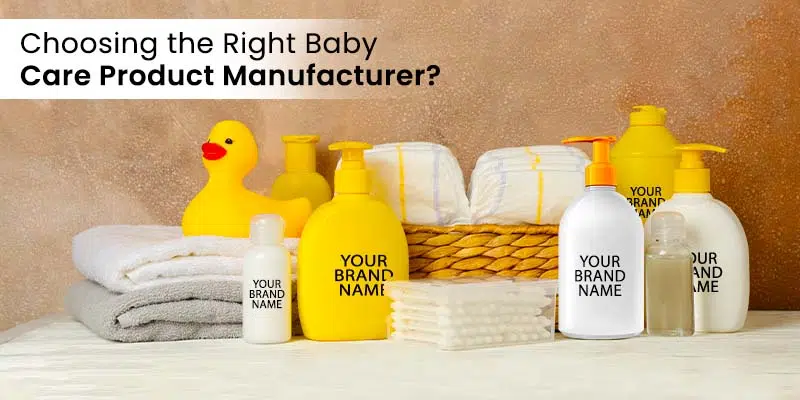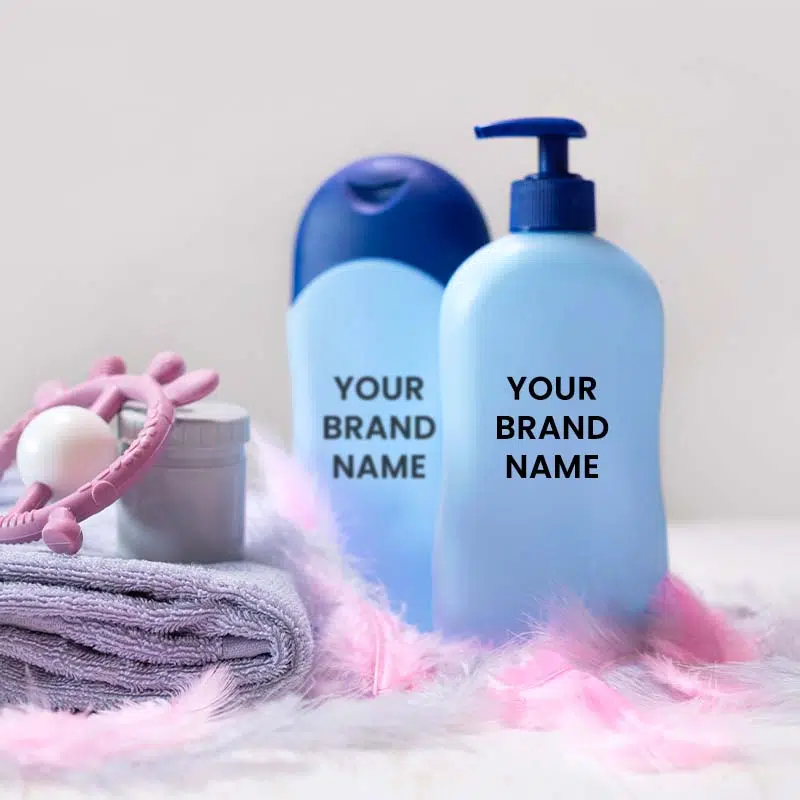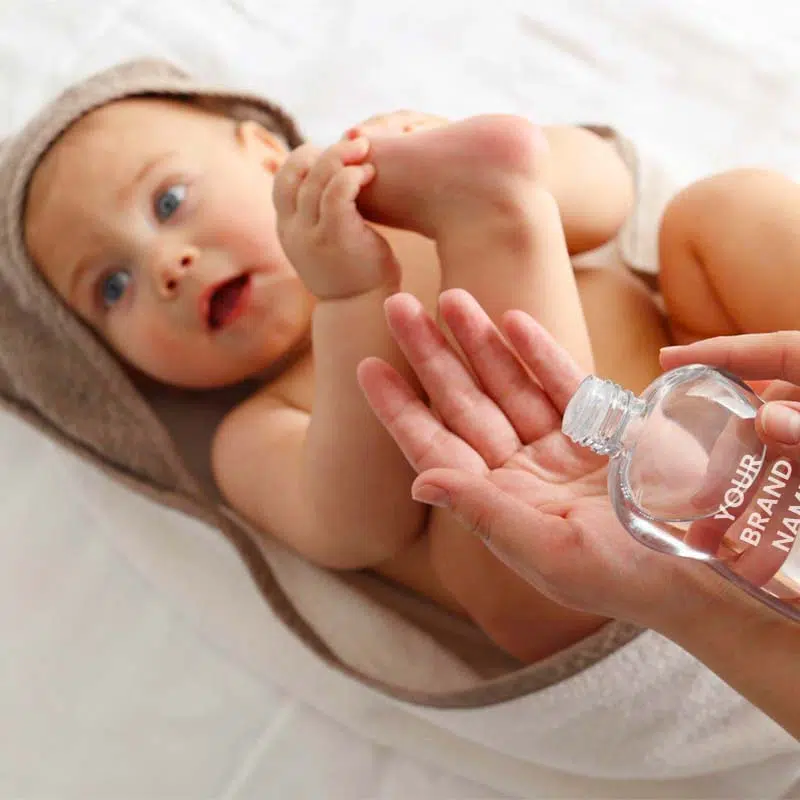
The baby care industry is a multi-billion-dollar market, and it continues to grow as new parents seek high-quality and safe products for their little ones. For aspiring entrepreneurs, embarking on the path of creating baby care brands requires careful planning and decision-making, and one of the most critical choices is selecting the right manufacturer.

To succeed in any industry, it’s important to understand its size and potential for growth. The Indian baby care products industry is experiencing significant growth and has a promising future.
According to market analysis, the market size of the Indian baby care products industry is expected to reach 15 Billion US dollars by 2028. The industry is projected to exhibit a compound annual growth rate (CAGR) of 14.95% during the period from 2023 to 2028. This growth can be attributed to various factors such as the rising per capita income, increased traveling, increasing health concerns of parents regarding their babies, and the growing number of nuclear families in India.
This guide aims to serve as a comprehensive resource for startups in the baby care product industry. We’ll look into essential steps and considerations, helping you make informed decisions while selecting a manufacturer. Whether you’re already deep into your venture or just beginning to explore the possibilities, this expertly crafted guide published after thorough research will assist you on your journey to creating affordable, profitable & high-quality baby care products.

Analyzing your competition is an essential step in your journey as a startup. Identify other brands and products in the baby care industry that cater to the same audience as you do. Understand their strengths, weaknesses, and unique selling points (USPs).
By studying your competition, you can find opportunities to differentiate your brand and product offerings. This insight will also help you choose a manufacturer that aligns with your brand’s values and quality standards.

Choosing a niche is a critical decision that can shape your startup’s success. In the vast baby care industry, a niche helps you focus your efforts and resources on a specific target market. It’s the foundation for building a unique and successful brand.
Keep a close eye on these trends and conduct thorough market research to identify the specific needs and preferences of your target audience or you can take the help of your private label manufacturer. Knowing what parents are looking for will help you define your niche and guide your choice of products and manufacturers.

Your choice of niche should be based on thorough market research. Investigate your target market’s demographics, psychographics, and purchase behavior. Are you targeting first-time parents, eco-conscious consumers, or those with specific needs like allergies?
Understanding your target market will not only help you tailor your product offerings but will also guide your manufacturer selection. Different niches may require manufacturers with varying specializations and capabilities.

Your startup’s success will hinge on its ability to offer something unique to customers. What makes your baby care products stand out? Whether it’s innovative features, superior quality, affordability, or exceptional customer service, identifying your USPs is key to attracting and retaining customers.
When selecting a manufacturer, consider how they can help you achieve your USPs. Do they have the capabilities to produce innovative designs? Can they consistently maintain the quality you promise to your customers?

The location of your manufacturer can significantly impact your supply chain efficiency. Proximity to your manufacturer can reduce transportation costs and lead times. On the other hand, a manufacturer in a low-cost region may offer cost savings.
Consider the advantages and disadvantages of each option. Manufacturers located abroad can be cost-effective, but they may also pose challenges related to communication, quality control, and lead times. Proximity, on the other hand, can facilitate a more hands-on approach to production and quality assurance.
Your choice of manufacturer should align with your product requirements. Some manufacturers specialize in certain product categories, such as baby clothing or skincare products, while others offer a more diverse range of services.
Evaluate the manufacturer’s capabilities, including their production capacity, equipment, and technology. Ensure they can meet your product specifications and any unique requirements, such as organic or hypoallergenic materials.
The safety and quality of baby care products are paramount. Manufacturers must adhere to specific standards and certifications to ensure that their products meet safety and regulatory requirements. For instance, in the United States, the Food and Drug Administration (FDA) has regulations that apply to various baby care products.
As a startup, you may not have the financial resources to place large orders. It’s important to discuss minimum order quantities (MOQs) with potential manufacturers. Some may have flexible MOQs that suit smaller businesses, while others may require larger commitments.
Consider your startup’s growth prospects and how the manufacturer can accommodate your evolving needs. A manufacturer that can scale production as your business grows is an invaluable partner for a startup.
Cost is always a significant factor for startups. However, it’s important to strike a balance between cost and quality. The cheapest manufacturer may not always offer the best quality or compliance with safety standards.
Request detailed quotes from potential manufacturers and compare them based on factors like production costs, shipping costs, and any additional fees. Remember that quality and safety should be a priority, as compromising on these aspects can damage your brand’s reputation and lead to costly recalls.
The internet is a valuable resource for researching potential manufacturers. Start by exploring manufacturer directories and industry-specific websites. Look for manufacturers with experience in the baby care product industry and favorable customer reviews.
Online research can provide you with a list of potential manufacturers to further investigate. Be sure to check for any red flags or negative feedback as well.
Once you’ve identified potential manufacturers, it’s time to reach out and request quotes or proposals. Be prepared to share detailed information about your product specifications, including materials, design, and production volume.
If possible, consider conducting site visits and facility inspections. This allows you to see the manufacturer’s operations firsthand and assess their working conditions, equipment, and quality control processes.
While visiting the manufacturer may not always be feasible, it’s highly recommended when dealing with critical product aspects, such as safety or quality.
Quality assurance is non-negotiable when it comes to baby care products. Parents trust your brand to provide safe and reliable items for their children, and any compromise on quality can lead to severe consequences for your startup.
Ensure that the manufacturer has robust quality control measures in place, from raw material inspection to final product testing. Discuss how they handle quality issues and recalls if they occur.
The baby care product industry is heavily regulated, and safety is paramount. Depending on your product category, there may be specific regulations and certifications that apply. In the United States, baby care products often fall under the jurisdiction of the FDA.
Discuss the manufacturer’s experience with regulatory compliance and ensure they can produce products that meet the necessary safety standards and labeling requirements.
In conclusion, selecting the right manufacturer is a critical step in creating safe, high-quality baby care products. As a startup, you need a manufacturing partner who can deliver consistent quality, embrace innovation, and align with your brand’s values. Nutriglow Private Label is a leading manufacturer of baby care products, dedicated to providing comprehensive solutions for startups in the industry. With their state-of-the-art facilities, cutting-edge technology, and experienced team, Nutriglow Private Label can help you bring your vision to life.
I'm here to help you find what you need!
HELLO THERE
